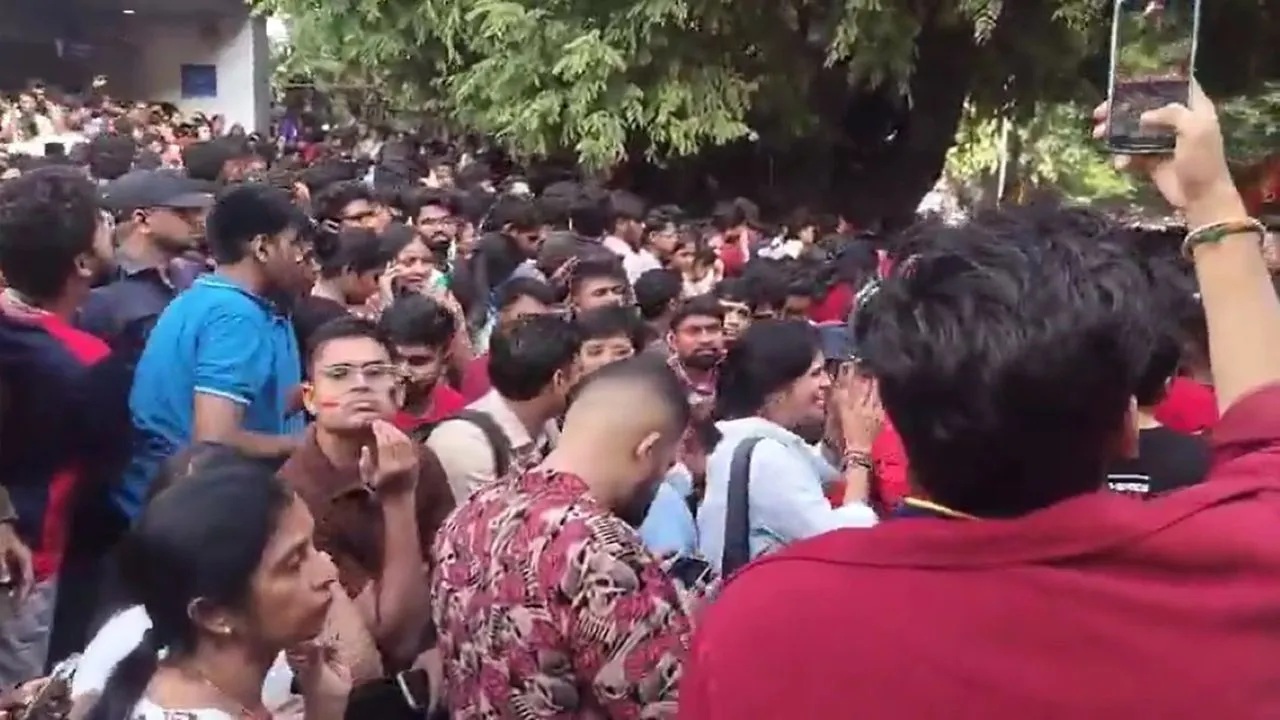The decision follows the Justice Cunha Commission’s scathing findings, which held the organisers and senior police officers accountable for gross negligence, unauthorised event management, and failure to enforce even the most basic safety protocols.
Published Jul 24, 2025 | 3:58 PM ⚊ Updated Jul 24, 2025 | 5:51 PM

More than 2 lakh people had arrived at M Chinnaswamy Stadium, which can accommodate only around 32,000 people, leading to the stampede.
Synopsis: The Karnataka Cabinet has formally accepted the Justice John Michael D’Cunha Commission’s report on the 4 June Chinnaswamy Stadium stampede, which claimed 11 lives and injured over 50 people. The report held the IPL franchise Royal Challengers Bengaluru, the Karnataka State Cricket Association, and DNA Entertainment Networks Pvt. Ltd. responsible for unauthorised and poorly managed event planning, along with several senior police officers for negligence. The government has approved legal action against the private organisers and ordered departmental inquiries into the officials.
The Karnataka Cabinet on Thursday, 24 July, approved the Justice John Michael D’Cunha Commission’s report on the Chinnaswamy Stadium stampede that left 11 people dead and more than 50 injured.
The Cabinet also cleared the way for legal action against the Indian Premier League (IPL) franchise Royal Challengers Bengaluru (RCB), the Karnataka State Cricket Association (KSCA), and event organiser DNA Entertainment Networks Pvt Ltd.
“The state cabinet has approved Justice D’Cunha’s report. After discussion, the report submitted regarding the stampede incident during the victory celebrations at Chinnaswamy Stadium on June 4, 2025, has been accepted. The cabinet has decided to take legal action against the private organisations and government officials mentioned in the report, and to conduct departmental inquiries against the government officials,” the Chief Minister’s Office said in a statement.
The decision follows the Justice D’Cunha Commission’s scathing findings, which held the organisers and senior police officers accountable for gross negligence, and failure to enforce even the most basic safety protocols.
On 17 July, the state had similarly blamed RCB management and the organisers of its victory parade for the stampede, in a comprehensive status report submitted to the Karnataka High Court in a suo motu case being heard by the court.
According to the report, the victory parade to celebrate RCB’s maiden IPL title was held without obtaining the mandatory permissions from licensing authorities. The organisers failed to submit the required application under Government Order No. HD 149 SST 2009, dated 04.03.2009, and did not furnish basic details such as the venue layout, estimated crowd size, traffic plan, or emergency contacts.
“The organisers were duty-bound to obtain prior permission by submitting an application in the prescribed format at least seven days in advance of the proposed event… However, the organisers failed to obtain the requisite permission/licence and failed to follow the procedure laid down,” the report states.
Despite these clear violations of the Licensing and Controlling of Assemblies and Processions (Bengaluru City) Order, 2009, the event was allowed to proceed.
Furthermore, the report holds accountable the same police officials who were suspended in the immediate aftermath of the stampede.
These include senior police officers: B Dayananda, IPS (Commissioner of Police), Vikash Kumar Vikash, IPS (Additional Commissioner, West), Shekhar H Tekkanavar, IPS (DCP – Central), C Balakrishna, ACP, Cubbon Park Sub-Division, and Girish AK, Police Inspector, Cubbon Park Police Station, for failing “to stop the unauthorised event despite being aware of its legal status.”
The report documented several lapses:
Fatalities occurred at multiple points: four at Gate 7, two at Gate 6, one at Gate 1, and four between Gates 17 and 21.
The Commission has recommended legal proceedings against:
The report warned that the existing infrastructure of Chinnaswamy Stadium is unfit for large-scale events and should not be used for such gatherings without significant structural and operational reforms.
It called for mandatory provisions at all future public events, including:
It further recommended that events expecting large crowds be held at purpose-built venues with:
Until these changes are implemented, the Commission has cautioned that hosting high-attendance events at Chinnaswamy Stadium will continue to pose “unacceptable risks to public safety, urban mobility, and emergency preparedness.”
Chinnaswamy Stadium is the home ground of the RCB team and hosts regular IPL matches, which draw large crowds each season.
The stampede occurred on the evening of 4 June, when more than 300,000 fans gathered around M Chinnaswamy Stadium to celebrate RCB’s first-ever IPL title. The crowd – nearly nine times the stadium’s capacity of 35,000 – overwhelmed the venue’s narrow entry gates and minimal policing infrastructure.
The Karnataka High Court took suo motu cognisance of the incident on 5 June and directed the state to file a comprehensive status report, which was later submitted with details of the deceased, the injured, and the lapses in planning.
The same day, the state government appointed retired High Court judge John Michael D’Cunha to head a commission and submit a report within a month on the stampede.
The government offered compensation of ₹10 lakh for each deceased person, while the KSCA has pledged an additional ₹5 lakh per victim.
Despite initial claims that over 2,400 police personnel were deployed across the city, the report concluded that the core event site lacked adequate security. For comparison, regular IPL matches at the same venue – typically attended by around 32,000 spectators – are managed with over 700 officers, nearly ten times the number present during the stampede.
The Justice Cunha Committee’s report has now been formally accepted. Legal proceedings are expected to begin shortly against those found responsible.
(Edited by Dese Gowda)
